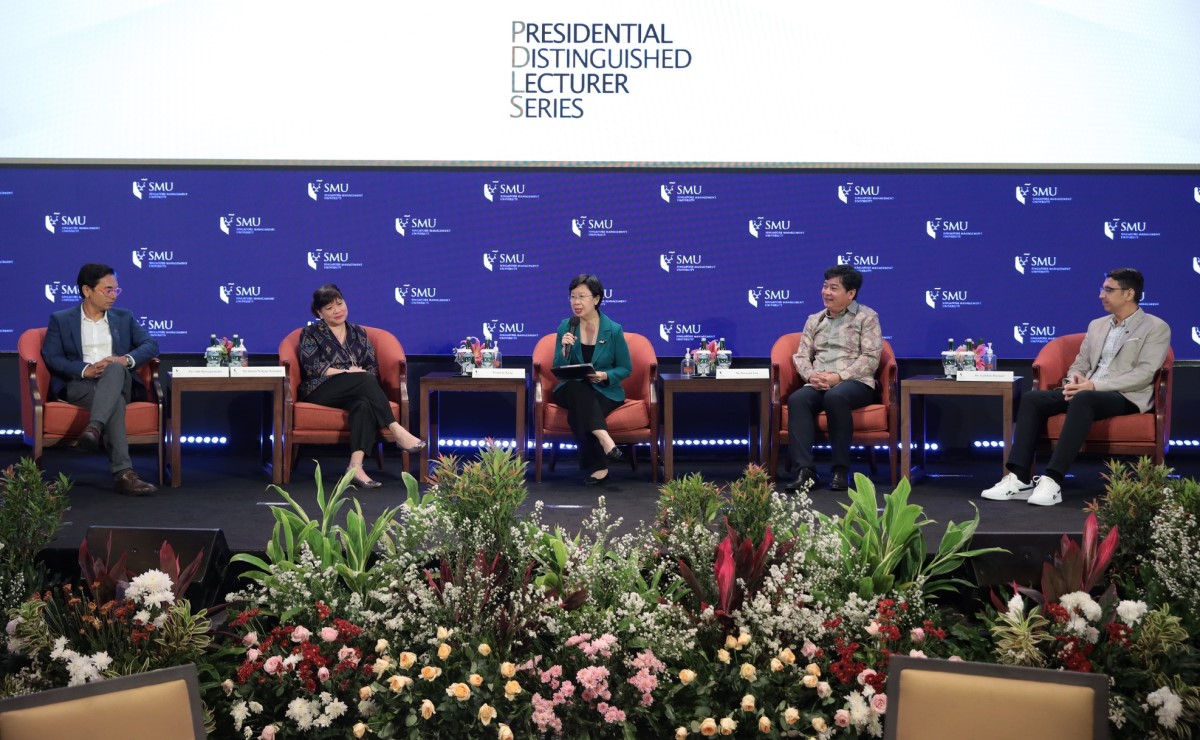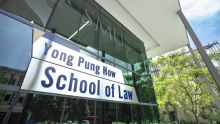Exchanging knowledge to develop a sustainability talent pipeline

During SMU’s first Presidential Distinguished Lecturer Series (PDLS) held overseas, in Jakarta, SMU President Professor Lily Kong moderated an eminent panel who spoke on the importance of developing a talent pipeline pertaining to sustainability in Indonesia, as well as exploring various strategies to help bridge existing skills shortages.
In the emerging economy of Indonesia, the competition for talent has grown fiercer than ever. With a rapidly growing population, disrupted business landscape and ever-changing workforce dynamics, it is crucial for organisations to develop a strong pool of top talent trained in providing sustainability solutions across industries to stay ahead. As such, multiple companies are turning their sights on establishing more successful programmes that focus on building an effective local talent pipeline while balancing global recruitment needs.
These changes were discussed at SMU’s PDLS in December 2022, themed Building a Sustainability Talent Pipeline for Indonesia. The panel comprised Ms Shinta Widjaja Kamdani, Chief Executive Officer, Sintesa Group; Mr Aldi Haryopratomo, Entrepreneur on Sabbatical, who is also a member of the SMU International Advisory Council Indonesia; Mr Bernard Tan, Country President (Singapore) / Managing Director APP, Sinar Mas; Mr Gulshan Harjani, Founder and Chief Executive Officer, Communicating World, who is also a member of the SMU International Advisory Council Indonesia, and President of the SMU Alumni Chapter in Indonesia.
A partnership grounded in strong relationships
In her welcome remarks, Professor Kong expressed her pleasure at the launch of the University’s very first Overseas Centre in Jakarta, which plays an integral role within the context of SMU’s strategic plan launched in 2020.
“In line with Growth in Asia strategic priority, we have identified the establishment of a network of overseas centres as an important step towards strengthening collaborations, enabling deeper cross-cultural understanding, and collectively contributing to the growth of the region,” said Professor Kong, sharing her belief that these overseas centres would allow SMU to drive deeper engagement with the University’s trusted partners to successfully make a meaningful impact on communities in different parts of Asia.
Sustainability talent pool
At the start of the PDLS, Professor Kong directed the discussion toward the topics of sustainability and education. Acknowledging Indonesia’s potential to be a climate powerhouse given its vast natural resources, Professor Kong expressed a belief that Indonesia’s climate mitigation and adaptation measures would have a significant impact on a global scale. With this in mind, she kickstarted the discussion with the types of skills and workers needed for Indonesia to meaningfully contribute to climate action, as well as benefit from growth in the sustainability sector.
Rounding up her opinion, Ms Shinta highlighted what she felt was the most basic prerequisite—mindset. “When we talk about sustainability and jobs, people first need to have the mindset that this is important. Rather than feeling forced or pushed into existing job scopes, we need to adopt an understanding that they can indeed commit to sustainability measures.”
Cultivating awareness in multi-disciplinary sustainability practitioners
On top of cultivating the right mindset in talent, Mr Tan shared his belief that a sustainability practitioner needs to be multi-functional. The role demands a basic appreciation of environmental science to understanding how decisions and actions can impact the environment, before taking steps towards reducing a company’s carbon footprint.
Furthermore, sustainability practitioners should grasp economic and business incentives and how they drive behaviours, as well as the social and political drivers that would affect sustainability.
“Sustainability is a topic that integrates a wide range of disciplines; just like the way SMU is promoting a much broader-based education,” he said.
“Rather than going deep into one subject, I think a sustainability practitioner needs to join the dots across disciplines.”
Moving the discussion forward Mr Gulshan was of the similar view that it was important to develop a stronger awareness in students as part of the multi-disciplinary education for sustainability practitioners. While most are aware that there are various climate issues, what he felt is lacking is an awareness of how severe the problem is in more concrete terms.
“Indonesia, for example, is the fourth largest nation, and sixteenth largest economy in the world, is the tenth largest emitter of greenhouse gases according to some reports,” Mr Gulshan stated, going on to elaborate that awareness is key to empowering students, who are better positioned to make a bigger impact in sustainability.
Using partnerships to effect change
Partnerships are another key aspect of cultivating talent in the field of sustainability. During the session, Mr Aldi discussed how vocational training might be most useful in terms of fighting climate change in Indonesia, using one of Indonesia’s ample resources—its coastline—as an example.
Sharing that one hectare of seagrass sequesters the same amount of carbon as 15 hectares of rainforest Mr Aldi then talked about how a partnership with Scripps Institution of Oceanography in San Diego can result in a practical training programme.
“This will create a lot of young, motivated people who understand how we can turn this gold mine of carbon into something real,” he asserts.
“Such knowledge can be applied to many different sectors in Indonesia to create many professionals on the ground that will be able to figure out business models that are sustainable and can put us on the world stage.”


